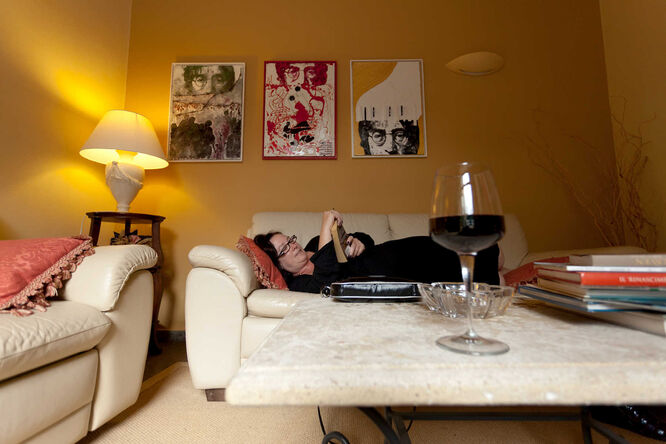Sleeping Alternatives: Bunking with the Locals
By Rick Steves
These days, when I travel to Europe, I usually sleep in hotel rooms or B&Bs. But in my early travel days, I routinely found places where I could sleep for free or very cheap. In Austria, I had "dear parents" who were actually the parents of my sister's ski instructor. In London, my hosts were friends of my uncle. Neither relationship was terribly close — until I visited. Now we are friends for life.
There's no better way to get to know a new country than to stay in someone's home. There are several ways to do this for free, from swapping houses to crashing on your neighbor's cousin's couch.
Being a guest in a European home isn't all that different from being a guest in an American one. Before you arrange to stay with someone, though, consider the possible drawbacks of your free bed. At a hotel, B&B, hostel, or short-term rental you have no social obligations to your host, and it isn't perceived as rude to return late at night. There's also location to consider: If you're sleeping where others live, there's a decent chance you'll be in a workaday suburb, far from old-town charm or the sights you came to see. You'll probably be able to reach the city center on your own (thanks to Europe's great public transit), but that commute will cost you time and money. Nonetheless, for those aware of the trade-offs, crashing with locals can be a great option.
Volunteering and Cultural Exchanges: If you believe that travel is about community good and bringing people together, consider joining a cultural-exchange organization, which lets you stay with hosts in their home or finding volunteer work abroad. Note that while travelers do get a free bed with their hosts, the focus is much less about providing accommodation than an opportunity to connect and contribute.
Bunking with Friends (or Friends of Friends)
Staying with a friend, relative, or common acquaintance not only stretches your budget (usually along with your belly), but your cultural horizons. Try and dig up some European relatives, friends, friends of relatives, or relatives of friends. No matter how far out on the family tree they are, unless you're a real jerk, they'll be tickled to have an American visitor in their nest. I email my potential host, telling them when I'll arrive and asking if they'd be free to meet for dinner while I'm there. They answer with "Please come visit us" or "Have a good trip." It's obvious from their response (or lack of one) if I'm invited to stop by and stay awhile.
Especially if you are traveling solo and reasonably extroverted, you're likely to make new friends on the road. When people meet, they invite each other to visit. Once invited to visit, I warn my new friends that I may very well show up some day at their house, whether it's in Osaka, Auckland, Santa Fe, or Dublin. When I have, it's been a good experience.
If you're afraid of being seen as a freeloader, remember that both parties benefit. A Greek family is just as curious about you as you are about them. Armed with pictures from home and a bag of goodies for the kids, make a point of giving as much from your culture as you are taking from theirs. I insist on no special treatment other than to be treated simply as part of the family. If you ask for a favor, make it easy for your host to say no. Help with the chores, don't wear out your welcome, and follow up each visit with postcards or emails to share the rest of your trip. It's easy and thoughtful to reimburse your hosts for their hospitality with a bottle of wine, a bunch of flowers, or a thank-you note, possibly with photos of all of you together.
Tips for Staying with Locals
Not only are you a guest in someone's home, you are also a guest in their country. These tips can help ensure a pleasant experience.
Ask your host for guidance. People who are OK with welcoming guests in their home are usually friendly, interested in others, and eager to show off their town. You'll likely be greeted with genuine enthusiasm. Many hosts happily provide maps, sightseeing and transit information, and advice on how to make the most of your time.
Do your cultural homework. Some awkwardness is inevitable — expect to make a faux pas or two. Limit embarrassing blunders by researching, before you arrive, etiquette in the country you're visiting. Follow your host's lead — if they're not wearing shoes in the house, leave yours at the door. Be aware of what makes for touchy conversation, and do your best to get squared away on geopolitical basics — e.g., Scotland isn't in England, and people in Barcelona consider themselves more Catalan than Spanish. To bridge a wide language gap, try to learn the elements of that country's nonverbal communication: What means "OK" in the US can mean something quite the opposite in some parts of Europe.
Communicate your plans. Clear communication and a focus on being considerate are critical when trying to bridge a linguistic or cultural divide. If you accept a bed from someone for free, it's polite to give your hosts plenty of advance warning of your arrival and not change plans at the last minute. Let your host know how long you expect to stay, whether you'll be there for dinner in the evening, and where to leave the key in the morning. If your host invites you to dinner, do your best to accept.
I love the idea of creatively finding a free or cheap bed in Europe. And when I reread my trip journals, I'm reminded that the less I spend, the richer experience I have.

